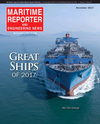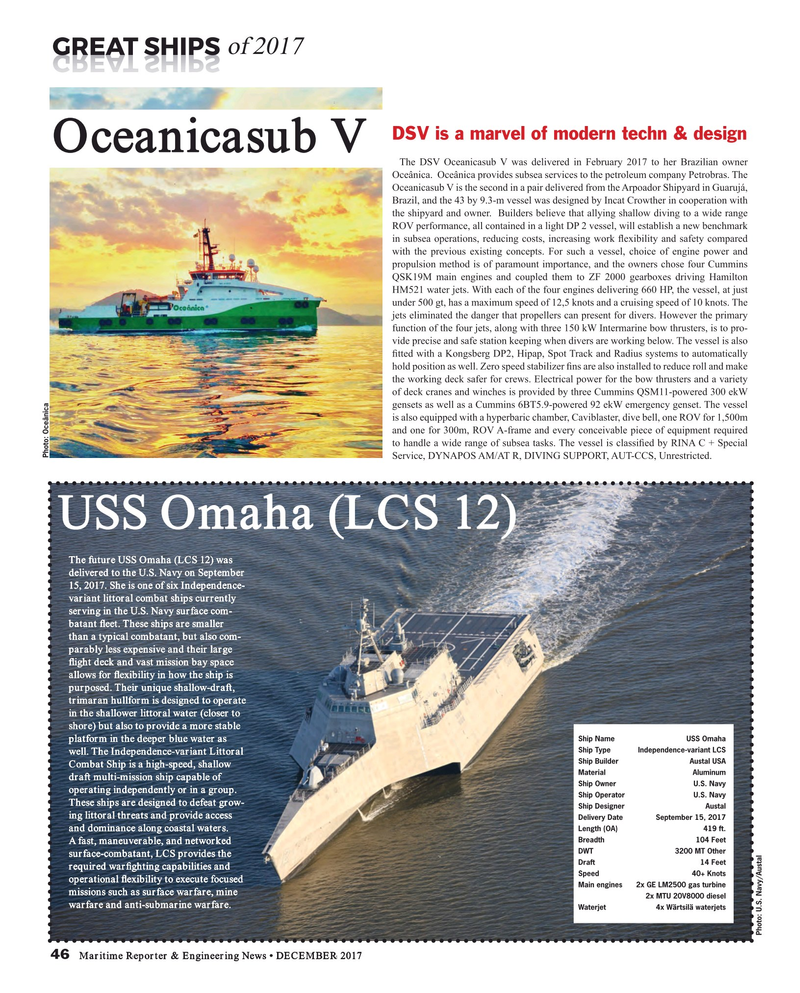
Page 46: of Maritime Reporter Magazine (December 2017)
U.S. Navy Quarterly
Read this page in Pdf, Flash or Html5 edition of December 2017 Maritime Reporter Magazine
GREAT SHIPS of 2017
DSV is a marvel of modern techn & design
Oceanicasub V
The DSV Oceanicasub V was delivered in February 2017 to her Brazilian owner
Oceânica. Oceânica provides subsea services to the petroleum company Petrobras. The
Oceanicasub V is the second in a pair delivered from the Arpoador Shipyard in Guarujá,
Brazil, and the 43 by 9.3-m vessel was designed by Incat Crowther in cooperation with the shipyard and owner. Builders believe that allying shallow diving to a wide range
ROV performance, all contained in a light DP 2 vessel, will establish a new benchmark in subsea operations, reducing costs, increasing work ? exibility and safety compared with the previous existing concepts. For such a vessel, choice of engine power and propulsion method is of paramount importance, and the owners chose four Cummins
QSK19M main engines and coupled them to ZF 2000 gearboxes driving Hamilton
HM521 water jets. With each of the four engines delivering 660 HP, the vessel, at just under 500 gt, has a maximum speed of 12,5 knots and a cruising speed of 10 knots. The jets eliminated the danger that propellers can present for divers. However the primary function of the four jets, along with three 150 kW Intermarine bow thrusters, is to pro- vide precise and safe station keeping when divers are working below. The vessel is also ? tted with a Kongsberg DP2, Hipap, Spot Track and Radius systems to automatically hold position as well. Zero speed stabilizer ? ns are also installed to reduce roll and make the working deck safer for crews. Electrical power for the bow thrusters and a variety of deck cranes and winches is provided by three Cummins QSM11-powered 300 ekW gensets as well as a Cummins 6BT5.9-powered 92 ekW emergency genset. The vessel is also equipped with a hyperbaric chamber, Caviblaster, dive bell, one ROV for 1,500m and one for 300m, ROV A-frame and every conceivable piece of equipment required to handle a wide range of subsea tasks. The vessel is classi? ed by RINA C + Special
Photo: Oceânica
Service, DYNAPOS AM/AT R, DIVING SUPPORT, AUT-CCS, Unrestricted.
USS Omaha (LCS 12)
The future USS Omaha (LCS 12) was delivered to the U.S. Navy on September 15, 2017. She is one of six Independence- variant littoral combat ships currently serving in the U.S. Navy surface com- batant ? eet. These ships are smaller than a typical combatant, but also com- parably less expensive and their large ? ight deck and vast mission bay space allows for ? exibility in how the ship is purposed. Their unique shallow-draft, trimaran hullform is designed to operate in the shallower littoral water (closer to shore) but also to provide a more stable
Ship Name USS Omaha platform in the deeper blue water as
Ship Type Independence-variant LCS well. The Independence-variant Littoral
Ship Builder Austal USA
Combat Ship is a high-speed, shallow
Material Aluminum draft multi-mission ship capable of
Ship Owner U.S. Navy operating independently or in a group.
Ship Operator U.S. Navy
These ships are designed to defeat grow-
Ship Designer Austal ing littoral threats and provide access
Delivery Date September 15, 2017
Length (OA) 419 ft.
and dominance along coastal waters.
Feet Breadth 104
A fast, maneuverable, and networked
DWT 3200 MT Other surface-combatant, LCS provides the
Feet Draft 14 required war? ghting capabilities and
Knots Speed 40+ operational ? exibility to execute focused
Main engines 2x GE LM2500 gas turbine missions such as surface warfare, mine 2x MTU 20V8000 diesel warfare and anti-submarine warfare.
Waterjet 4x Wärtsilä waterjets
Photo: U.S. Navy/Austal 46 Maritime Reporter & Engineering News • DECEMBER 2017
MR #12 (42-49).indd 46 MR #12 (42-49).indd 46 12/6/2017 12:21:08 PM12/6/2017 12:21:08 PM

 45
45

 47
47
